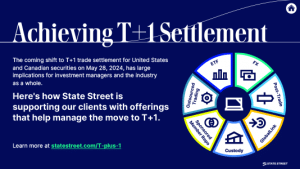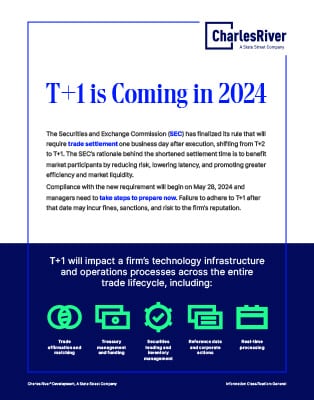The Securities and Exchange Commission (SEC) has finalized its rule that will require trade settlement one business day after execution, shifting from T+2 to T+1. The SEC’s rationale behind the shortened settlement time is to benefit market participants by reducing risk, lowering latency, and promoting greater efficiency and market liquidity. Compliance with the new requirement will begin on May 28, 2024 and managers need to take steps to prepare now. Failure to adhere to T+1 after that date may incur fines, sanctions, and risk to the firm’s reputation.
T+1 will impact a firm’s technology infrastructure and operations processes across the entire trade lifecycle, including:
- Trade affirmation and matching
- Treasury management and funding
- Securities lending and inventory management
- Reference data and corporate actions
- Real-time processing
While preparation for T+1 has many facets, the significant components for readiness include the reduction of manual processes in favor of increased automation and the adoption of straight-through processing.
Charles River has been preparing for this largely anticipated change, and the Charles River Investment Management Solution (Charles River IMS) provides post-trade processing and trade settlement workflows that will support firms as they transition to T+1:
- Post-trade lifecycle management in one system
- Centralized trade confirmation through an automated straight-through processing workflow
- CTM match-to-instruct functionality
- Fast identification of failed trades and exceptions
- Dealers and traders, portfolio managers, compliance, and operations personnel all have the same real-time view of all post-trade processing activity
- Exception handling at the allocation level
- Consistent and accurate standing settlement default rules and instructions
- Automatic leverage of commission and fee rules that support override and post-trade matching corrections
The Road to T+0
It may seem premature to talk about T+0 when T+1 has yet to go into effect. However, consider that T+3 was implemented in 1993, followed by T+2 in 2017. The shift to T+1 is occurring just seven years later. As firms prepare systems and processes for T+1, it is worth considering a possible transition to T+0 in the future. Once again, technology is an enabling factor and here distributed ledger technology (DLT) presents opportunities.
The nature of DLT as a decentralized, immutable, and transparent database aligns with the requirements of T+0 settlement. DLT eliminates the possibility of a single point of failure, making it more resilient. All involved parties interact directly, using the same data at the same time, which improves transparency and trust.
These characteristics can create seamless, accurate, and near real-time settlement. However, the changes to infrastructure and process needed to adopt T+0 go beyond technology. The current ecosystem for trade settlement includes a multi-step process that requires collaboration among different parties. T+1 will still fit within that current framework, but T+0 will not – getting to same day settlement would require a significant overhaul of the existing process and infrastructure. Technology has disrupted and forced change within the financial services industry and in this case the trade settlement process will continue to reap the benefits of a more efficient market as we look towards the next transition from T+1 to T+0.
State Street Alpha: Artificial Intelligence Backed by Real Intelligence
What happens when you rigorously integrate AI into the premier front-to-back trading platform? Your capabilities suddenly become a whole lot more capable.
Read More
Want to learn more? Get in touch.
We’re ready to answer your questions. Contact us or follow us on our social channels.
Looking for an OEMS System?
5675046.1.1.GBL.
Disclaimers and Important Risk Information
Charles River Development – A State Street Company is a wholly owned business of State Street Corporation (incorporated in Massachusetts).
This document and information herein (together, the “Content”) is subject to change without notice based on market and other conditions and may not reflect the views of State Street Corporation and its subsidiaries and affiliates (“State Street”). The Content is provided only for general informational, illustrative, and/or marketing purposes, or in connection with exploratory conversations; it does not take into account any client or prospects particular investment or other financial objectives or strategies, nor any client’s legal, regulatory, tax or accounting status, nor does it purport to be comprehensive or intended to replace the exercise of a client or prospects own careful independent review regarding any corresponding investment or other financial decision. The Content does not constitute investment research or legal, regulatory, investment, tax or accounting advice and is not an offer or solicitation to buy or sell securities or any other product, nor is it intended to constitute any binding contractual arrangement or commitment by State Street of any kind. The Content provided was prepared and obtained from sources believed to be reliable at the time of preparation, however it is provided “as-is” and State Street makes no guarantee, representation, or warranty of any kind including, without limitation, as to its accuracy, suitability, timeliness, merchantability, fitness for a particular purpose, non-infringement of third-party rights, or otherwise. State Street disclaims all liability, whether arising in contract, tort or otherwise, for any claims, losses, liabilities, damages (including direct, indirect, special or consequential), expenses or costs arising from or connected with the Content. The Content is not intended for retail clients or for distribution to, and may not be relied upon by, any person or entity in any jurisdiction or country where such distribution or use would be contrary to applicable law or regulation. The Content provided may contain certain statements that could be deemed forward-looking statements; any such statements or forecasted information are not guarantees or reliable indicators for future performance and actual results or developments may differ materially from those depicted or projected. Past performance is no guarantee of future results. No permission is granted to reprint, sell, copy, distribute, or modify the Content in any form or by any means without the prior written consent of State Street.
The offer or sale of any of these products and services in your jurisdiction is subject to the receipt by State Street of such internal and external approvals as it deems necessary in its sole discretion. Please contact your sales representative for further information.
State Street may from time to time, as principal or agent, for its own account or for those of its clients, have positions in and/or actively trade in financial instruments or other products identical to or economically related to those discussed in this communication. State Street may have a commercial relationship with issuers of financial instruments or other products discussed in this communication
©2022 STATE STREET CORPORATION


